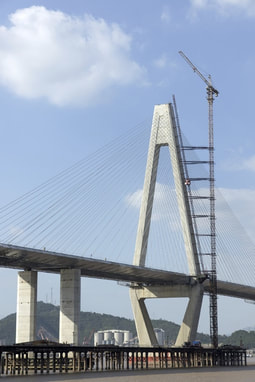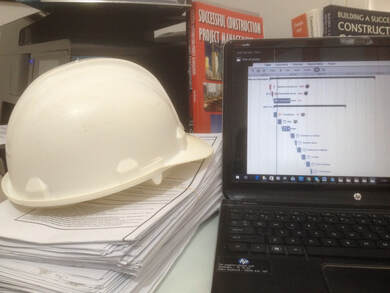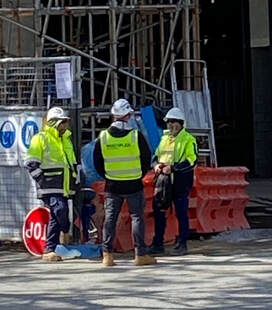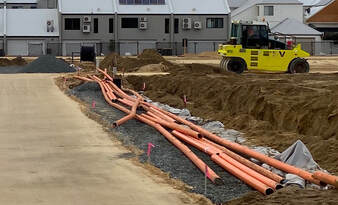"Managing a construction project isn't easy and requires several skills." Managing a construction project must be one of the most difficult jobs there is. To do it requires a large skill set. Some skills can be learned by attending courses, colleges or universities. Others are only learned through experience, and often the hard way – learning from mistakes! Below are some of the skills I think it takes to manage a construction project. See if you agree. What skills do you think it takes to successfully manage a construction project? How did you learn your skills and how can we improve the skills of our future Project Managers? #constructionmanagement #constructionmanagementtips #constructionprojects Skills required to manage a construction project
"plan the construction process"
"Must be able to manage, work with, and interact with people."
"Project Managers must coach and mentor their team"
"take action to prevent problems from occurring, and solve those that do occur."
Construction teams must be managedIn some cases, on large construction projects, there may be a team to assist the Project Manager, consisting of specialist resources, such as Planners, Quality Control Managers, Safety Managers, Engineers, Contract Administrators, clerical staff, and so on. But even in this fortunate position they must manage the processes, and ensure there is full compliance on the project, therefore they’ll need to understand these processes. The Project Manager will have to delegate and motivate their team, using the skills of the individual members and guiding them towards the common goal. "This book is fun to read and full of examples of what to be aware of with project management." (Reader on Amazon) Every construction project is different"No construction project is exactly the same as the previous one; each is unique, with its own set of problems and parameters." Then just as you have mastered all the problems on one project and successfully completed you move to a new project and do it all over again. Often the new project is for a new client in a different location, working with a new team, with different subcontractors and suppliers. The project could be completely different and result in you using different skill sets. No construction project is exactly the same as the previous one; each is unique, with its own set of problems and parameters. What do you think makes a great construction project manager? Thanks for reading this article. I hope you found it useful. Please share or like so others in your network can read it. Other similar articles by the author: Why we should take construction safety seriously. Did you make a difference on your construction project today? Simple steps to make your construction project more successful. (Written by Paul Netscher the author of the acclaimed books ‘Successful Construction Project Management: The Practical Guide’ and ‘Building a Successful Construction Company: The Practical Guide’. Both books are available in paperback and e-book from Amazon and other retail outlets. This article is adapted from information included in these books. ) © 2022 This article is not to be reproduced for commercial purposes without written permission from the author.
construction management construction project management
2 Comments
7/3/2018 11:47:42 pm
I appreciated your article on what it takes to manage a construction project. I like when you said that a manager should have technical skills and knowledge. Where do I learn these skills and information?
Reply
Paul
8/3/2018 01:45:22 pm
Hi Sutton, there are various courses you can attend to learn technical skills. Obviously working with experienced knowledgeable people will teach you a lot. Always look around and see what others are doing. Ask questions.
Reply
Leave a Reply. |
Archives
June 2024
Note: We welcome genuine comments, especially comments that add additional information to the subject matter in the article. We however reserve the right to remove inappropriate comments, which includes comments that have nothing to do with the subject, comments that include inappropriate language, and comments that are an advertisement for a product or company, or which include an advertising link. Comments must be in English. We will not enter into discussion on why a particular comment was removed.
CategoriesCopyright 2016 - The attached articles cannot be reproduced for commercial purposes without the consent of the author.
The opinions expressed in the attached articles are those of the writer. It should be noted that projects are varied and different laws and restrictions apply which depend on the location of the contractor and the project. It's important that the reader uses the supplied information taking cognisance of their particular circumstances. The writer assumes no responsibility or liability for any loss of any kind arising from the reader using the information or advice contained herein. "I have what I consider some of the best books on construction management."
Books are available from: Amazon.com Amazon.co.uk takealot.com kalahari.com Amazon.in Amazon.de Amazon.fr Amazon.it Amazon.com.au Powell's Fishpond uread bokus Amazon.ca Amazon.es Other retail stores Available in paperback or on Kindle "28 YEARS OF CONSTRUCTION PROJECT MANAGEMENT EXPERIENCE, DEVELOPING SUCCESSFUL CONSTRUCTION PROJECT MANAGERS AND BUILDING SUCCESSFUL CONSTRUCTION COMPANIES"
|












 RSS Feed
RSS Feed




